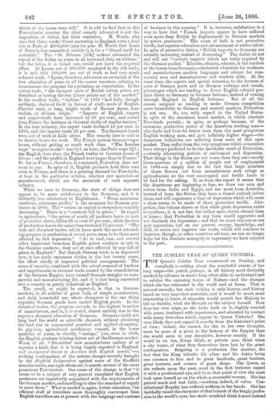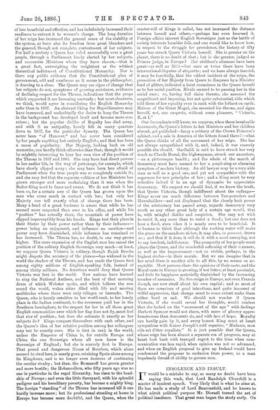THE JUBILEE YEAR OF QUEEN VICTORIA.
THE Queen's Jubilee Year commenced on Sunday, and everybody is writing about the wonderful events of her long reign—the period, perhaps, in all history most distinctly marked by advance in man's long effort alike to understand and to subdue the opposing forces of Nature—and the changes which she has witnessed in the world and at home. That is natural enough ; but such writing is only history, and history based on very imperfect materials, and it would be much more interesting to know, if etiquette would permit her Majesty to tell us frankly, what she thought on the subject herself. How does her own reign, as she looks back on it, slightly wearied with years, burdened with experiences, and educated by contact with many first-class minds, appear to Queen Victoria ? She very likely does not regard it exactly from the historian's point of view ; indeed, she cannot, for she, in her own thoughts, must be more of a pivot to the history of the Empire than she would seem to any chronicler, however courtly. If the world be on fire, Kings think, as private men think when a city barns, of what they themselves have lost by the great conflagration. Reigning is a profession like another, the fact that the King inherits his place and his duties being one common to him and to great landlords, great bankers, great brewers, and owners of great shops. The Queen, as she reflects upon the past, must in the first instance regard it with a professional eye, and from that point of view she must look upon herself as on the whole a successful woman. She has gained much and lost little,—nothing, indeed, of value. Con- stitutional Royalty has suffered nothing in her hands. She has decidedly raised the character of that branch of the kingly profes- sion in the world's eyes, has made mankind think it more instead of less beneficial and effective, and has indefinitely increased their readiness to entrust it to women's charge. The long duration of her reign has increased the general sense of the stability of the system, as have also its freedom from great blunders and the general, though not complete, contentment of her subjects. For half a century a Queen has ruled successfully over a great people, through a Parliament freely elected by her subjects, and successive Ministers whom they have chosen,—that is a great fact, outweighing the weightiest or the wittiest theoretical indictment of Constitutional Monarchy. Nor is there any public evidence that the Constitutional plan of government, odd and cumbrous as it seems to the philosopher, is drawing to a close. The Queen may see signs of change that her subjects do not, symptoms of growing resistance, evidences of declining respect for the Throne, indications that-the props which supported it are becoming unsteady ; but most observers, we think, would agree in considering the English Monarchy safer than in 1837. An abstract liking for Republicanism may have increased, and undoubtedly the desire to keep the Throne in the background has developed itself and become more con- scious; but the popular dislike of Royalty has died away, and with it an antipathy, keenly felt in many quarters down to 1837, for the particular dynasty. The Queen has never been "of Hanover," and has never been considered by her people anything but entirely English ; and that has been a cause of popularity. Her Majesty, looking back on old memories, can hardly think otherwise than that; though it would be mightily interesting to hear her own view of the position of the Throne in 1837 and 1886. She may have had direct powers in her earlier life, in the way of patronage, for example, which have slowly slipped away ; she may have been less afraid of Parliament when the true people was so completely outside it ; and she may feel that the separate volition of her Ministers has grown stronger and more enchaining than it was when the Sailor-King used to fume and swear. We do not think it has been so, for a certain awe of the Queen has grown upon the men who come much in contact with her; but only her Majesty can tell exactly what of change there has been. Many a head of a great business is aware that while he has seemed more respected than ever in his office, and while his " position " has actually risen, the essentials of power have slipped imperceptibly from his hands. Kings test their place in their States by their power rather than by their influence— power being an enjoyment, and influence an exertion—and power may have diminished, while influence has remained or has increased. The Throne has, no doubt, in one way grown higher. The mere expansion of the English race has raised the position of the solitary English Sovereign very much—at least, we suppose Queen Victoria is solitary, though Rajah Brooke might dispute the accuracy of the phrase—has widened in the world the shadow of the Throne, and has made the Queen first among eighty millions of English-speaking folk, instead of among thirty millions. No American would deny that Queen Victoria was first in the world. New nations have learned to sing the National Anthem, and the beat of that morning drum of which Webster spoke, and which follows the sun round the world, wakes cities filled with life and moving multitudes where there were only villages or barracks. The Queen, who is keenly sensitive to her world-rank, to her lonely place in the Indian continent, to the reverence paid her in the Southern hemisphere, to the respect for her in all those great English communities over which her flag does not fly, must feel that rise of position ; but does she estimate it exactly as her subjects do ? Kings compare themselves with each other, and the Queen's idea of her relative position among her colleagues may not be exactly ours. She is first in rank in the world, unless the Emperor of China is, for outside Europe and China the one Sovereign whom all men know is the Sovereign of England ; but she is scarcely first in Europe. That proud and dangerous House of Bourbon, which alone seemed to rival hers, is nearly gone, retaining Spain. alone among its Kingdoms, and is no longer even desirous of continuing the secular rivalry ; but then, the Romanoff has grown greater and more hostile; the Hohenzollern, who fifty years ago was no one in particular in the regal Hierarchy, has risen to the head- ship of Europe ; and even the little Savoyard, with his splendid pedigree and his hereditary poverty, has become a mighty king. The foreign "standing" of the Throne has increased till it can hardly increase more ; but its professional standing at home in Europe has become more doubtful, and the Queen, when the
muster-roll of Kings is called, has not increased the distance between herself and others,—perhaps has even lessened it. Foreign affairs interest English Sovereigns just as the battle of society interests humbler folk, and one would like to know how, in respect to the struggle for precedence, the history of fifty years has struck Queen Victoria herself. She is greater on the planet, there is no doubt of that ; but is she greater, judged as Princes judge, in Europe ? Her children's alliances have been great—as well as little—but once or twice there have been international disputes of etiquette ; and we have always fancied, it may be fancifully, that the oddest incident of the reign, the promotion of her Majesty from Queen to Empress by a Minister fond of glitter, indicated a faint uneasiness in the Queen herself as to her social position. Rivals seemed to be passing her in the social race ; so, having full claim thereto, she assumed the magnificent and imposing, but not quite substantial, title which told them of her equality even in rank with the loftiest on earth. Heiress of the Great Mogul, she mounted his throne, and signs herself, not, one suspects, without some pleasure, "Victoria, R. et I."
Our descendants will know, we suppose, when those invaluable documents, the Queen's letters to her Ministers and her children abroad, get published—fancy a robbery of the Crown Princess's cabinet, and a sale in America of the letters found there !—what the Queen thinks of all the movement of her reign. She has not always sympathised with it, and, indeed, it was scarcely possible she should. Garibaldi is said to have struck her very much as Claude Duval, the highwayman, struck our ancestors, —as a picturesque bandit ; and the whole of the march of democracy must have seemed to her a perplexing or alarming symptom of modern history. An old lawyer may be a very able man as well as a good one, and yet not sympathise with the eagerness for new principles of law ; and a King must be very reflective indeed if in an age of dynamite he appreciates democracy. We suspect we should find, if we knew the truth, that Queen Victoria, though indifferent about the suffrage,– Kings never see much difference between Ten-pounders and Householders—and not displeased that the closely knit power of the aristocracy has passed away, regards democracy very much as any other great lady of a certain age would, that is, with mingled dislike and suspicion. She may not wish to resist it, any more than to resist a flood ; but one does not love a flood, even when it is nearly sure to be beneficial. It is human to think that although the rushing water will make the grass on the meadows richer, it may also, en peasant, drown me; and that if it does, it will do it with a most annoying, not to say insolent, indifference. The prosperity of her people must please the Queen, and the wonderful softening of their n-.anners, as well as the improvement—not so visible, perhaps, in the highest circles—in their morals. But we can imagine that in her mind there is another side to all this, by no means so ac- ceptable. Most persons share the opinions of their caste, and the Royal caste in Europe is growing, if not bitter, at least pessimist, and feels its happiness materially diminished by the increasing number of assassins. No Sovereign in Europe, not even Francis Joseph, can now stroll about his own capital; and as most of them are conscious of good intentions, and quite innocent of wilful oppression, that change must to some extent make them either bard or sad. We should not wonder if Queen Victoria, if she would reveal her thoughts, would confess that she looked on the "movement of the ago" with feelings Herbert Spencer would not share, with more of gloomy appre- hensiveness than democrats do, and with less of hope. Royalty can hardly gain by it, and every honest King must at heart sympathise with Kaiser Joseph's cold repartee, "Madame, mon role eat retre royaliste." It is just possible that the Queen, whose reign has been almost a separate era of progress, may at heart look back with tranquil regret to the time when com- munication was less rapid, when opinion was not so advanced, and when an English proposal to give up Ireland would have condemned the proposer to exclusion from power, as a man hopelessly devoid of ability to govern men.



































 Previous page
Previous page